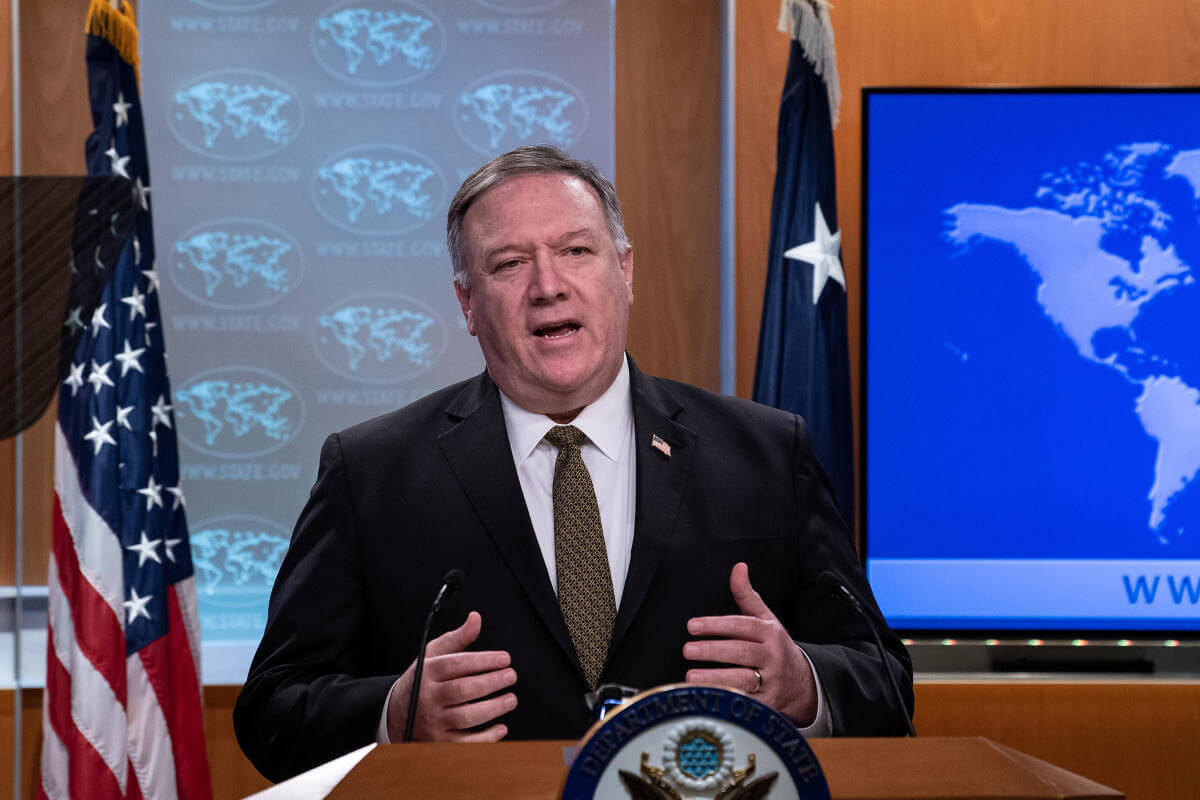US Secretary of State Mike Pompeo announced on Wednesday that the US no longer considers Hong Kong to be autonomous from China. Therefore, he said, “Hong Kong does not continue to warrant treatment under United States laws.” This strongly suggests that the Trump administration will suspend the preferential status it has extended to the former British colony.
Pompeo said, “The State Department is required by the Hong Kong Policy Act to assess the autonomy of the territory from China. After careful study of developments over the reporting period, I certified to Congress today that Hong Kong does not continue to warrant treatment under United States laws in the same manner as U.S. laws were applied to Hong Kong before July 1997.”
His announcement comes in the aftermath of China’s National People’s Congress signalling that it is looking to pass legislation that would outlaw “treason, secession, sedition, and subversion” in Hong Kong.
The proposed law, which is yet to receive the approval of China’s National People’s Congress, is driven in part by a desire to “improve” Hong Kong’s national security, after a serious of often violent protests over the last few years. Chinese Foreign Minister Wang Yi said that the law is necessary to guard against increasing “foreign meddling”, which China argues has infringed upon its national security. Thus, China wishes to strengthen the “legal system”, the “rule of law”, and enforcement mechanisms to give itself greater control over the former British colony.
In accordance with this, the “draft decision” says, “When needed, relevant national security organs of the Central People’s Government will set up agencies in Hong Kong to fulfil relevant duties to safeguard national security in accordance with the law.” This essentially paves the way for China to set up law enforcement agencies which run parallel to–and supersede–the city’s existing security forces. In essence, this strips yet another layer of autonomy from Hong Kong.
In response, Pompeo said that the proposed law subverts the “will of the people” and represents a “death knell” for Hong Kong’s “high degree of autonomy, democratic institutions, and civil liberties”. On Wednesday, he added, “While the United States once hoped that free and prosperous Hong Kong would provide a model for authoritarian China, it is now clear that China is modeling Hong Kong after itself.”
Thus, the US is now considering whether to suspend the Special Administrative Region’s (SAR) preferential tariff rates on its exports. The Trump administration is also considering ‘targeted sanctions’ against “Chinese officials, government entities, and businesses involved in enforcing the new legislation”.
Under new reporting requirements stipulated by the Hong Kong Human Rights and Democracy Act, Pompeo must certify an annual assessment of Hong Kong’s autonomy. Thus, the US State Department is legally required to submit a review of whether China is respecting the former British colony’s autonomy and if the financial hub still deserves preferential trading privileges. Given Pompeo’s words, it is clear that the US firmly believes that China is not respecting Hong Kong’s autonomy. It is expected that Trump could announce what steps the US will take as early as tomorrow.
It is unclear how far the US is willing to go in its retributive actions. Sanctions and tariffs will disincentivize doing business in Hong Kong, which could harm China’s economy. However, as we have seen in the US-China trade war, back-and-forth retaliatory measures benefit neither party. The US-China trade war under Trump cost the US roughly 300,000 jobs and $40 billion in lost exports. Similarly, it cost China $35 billion in lost exports. Given the two countries' interdependency, wherein 60% of all exports from China to the US are products manufactured by American firms in China, this trade war was mutually destructive.
There are over 1,200 American businesses in Hong Kong. The US Census Bureau reports that the US “exported $6.36 billion in goods and imported $952 million in goods from Hong Kong in the first quarter of 2020”.
As part of the 1997 agreement between the UK and China, Hong Kong was to enjoy a high degree of autonomy with an “independent executive, legislative, and judicial system, and control over its financial system, human rights, and freedoms”. China also tendered that Hong Kong citizens would be able to elect their own local government by 2017. However, China has repeatedly walked back on these assurances and promises. For example, in 2019, it proposed a law to extradite criminals from Hong Kong to China.
During the ongoing coronavirus pandemic, US-China relations have severely deteriorated, resulting in what China is referring to as a “new Cold War”. Pompeo’s latest announcement only serves to drive the wedge between the two parties even further.
US No Longer Considers Hong Kong Autonomous From China
The US will consider removing Hong Kong’s preferential trading and special status.
May 28, 2020

IMAGE SOURCE: AFP
